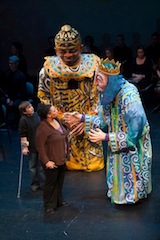The show-biz adage about working with children or animals --
i. e. don’t, because they will always steal the show – might be extended
to giant puppets.

This was the case with the Cincinnati Chamber Orchestra’s “Amahl and the Night Visitors” by Gian Carlo Menotti Dec. 22 at Xavier University’s Gallagher Center Theater. But who would have had it any other way?
The performance, a collaboration by the CCO and Madcap Puppet Theater, had its audience enthralled from the moment Mel Hatch Douglas, Nathan Neorr and Dylan Shelton as the Three Kings, Melchior, Balthazar and Caspar, appeared onstage.
Not that soprano Deborah Nansteel as the Mother, boy soprano Doug Hansford as Amahl and Kim Popa as the Page (sung by bass Thom Dreeze) did not hold their own against the Kings -- they did -- but it is hard to upstage three eight-feet-tall, walking, singing puppets (with voices by baritone Errik Hood as Melchior, tenor Brad Raymond as Kaspar and bass Gustav Andreassen as Balthazar).
All in all it was an “Amahl” to treasure and will likely become a holiday staple for Cincinnati. CCO music director Mischa Santora conducted the 22-piece chamber ensemble, with members of Xavier’s Edgecliff Vocal Ensemble (directed by Tom Merrill) and dancers from Pones Inc. (choreographed by Kim Popa).
The opera, first-ever written for television and premiered by NBC-TV on Christmas Eve, 1951, is the story of a crippled boy and his widowed mother, who are visited by the Three Kings on their way to Bethlehem to pay homage to the baby Jesus, whose star is guiding them. They are welcomed, and neighboring shepherds come to dance and sing for them, but the lure of their riches is too much for the poverty-stricken Mother, who tries to steal a piece of gold while they are sleeping. The Page catches her in the act, but the Kings forgive her and tell her that the child they seek has come to bless mankind and does not need their gold. She begs is remorseful in turn, expressing the wish that she had something to send to him. Amahl offers to send his crutch and as he hands it to them, is miraculously healed.
It is a heart-warming and musically rewarding show, with humor to boot (Kaspar is deaf, making for some light-hearted exchanges with Amahl). As staged by Irina Niculescu, the opera was set in the present, and the Kings’ visit takes place in a dream by Amahl. The setting was nevertheless subtle, with views of Cincinnati projected at the beginning and the end onto a full-stage backdrop reminiscent of Van Gogh’s “Starry Night.” There was also shadow puppetry against the sky of the Kings and the Star, again subtle, at several points during the show.
Musically, the performance was exceptional, with a soft, tender introduction that engaged this listener to a greater extent than the staging (so much so that the dream aspect was lost initially). Likewise, the singing brought the characters vividly to life, aided and abetted by some first-rate acting. Twelve-year-old Hansford’s star shone most brightly in this respect (remember the adage above), as he engaged and re-engaged with Nansteel and the Kings. Nansteel’s voice carried particular luster as the Mother, delivering her aria “All That Gold” with heart-felt emotion and soaring over the Kings in climactic moments.
Andreassen, Hood and Raymond sang beside the CCO, which was positioned on the left side of the stage, with the action transpiring on the right. All made a regal impression, Melchoir’s (Hood’s) aria, “O Woman, You May Keep That Gold,” carrying the import of the drama to magisterial effect. Dreeze as the Page made a fine impression, vocally, as did Popa dramatically. A special nod goes to the CCO oboists Lorraine Dorsey and Mark Ostoich for their nimble playing for Amahl (whose piping opens the show) and the shepherds’ dance. The dancers held large placards in front of them as they danced, which seemed more of a limitation and a distraction than an effective stage device.
Prior to the show, Cincinnati orthopedist Dr. James Sammarco spoke of his experiences as one of the first Amahls during the 1950s. Sammarco was selected by Menotti himself to understudy Chet Atkins (who premiered Amahl) and sang the role, both on television and on tour. It reminded the writer of an early “Amahl” in Morehead Kentucky in 1960, when she played viola in the orchestra for a touring production of "Amahl" with the original Three Kings.
For an interview with Sammarco, see “A Tale of Two ‘Amahls” at http://news.cincinnati.com/article/20121216/ENT03/312160052/A-tale-two-Amahls-six-decades-apart